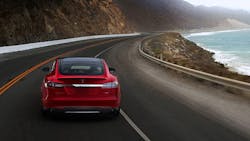Tesla’s Secret Source of Cash Unmasked as GM, Fiat Chrysler
For years, Tesla Inc. has hauled in revenue by selling credits to other carmakers that needed to offset sales of polluting vehicles to U.S. consumers. These sorts of transactions have largely been shrouded in secrecy -- until now.
General Motors Co. and Fiat Chrysler Automobiles NV disclosed to the state of Delaware earlier this year that they reached agreements to buy federal greenhouse gas credits from Tesla. While the filings are light on detail, they haven’t been reported on previously. They also represent the first acknowledgments from carmakers that they’re turning to Tesla for help to comply with intensifying U.S. environmental regulations.
The deal with GM will come as a surprise to those who thought years of sales of plug-in hybrid Chevrolet Volts and all-electric Chevy Bolts would leave the largest U.S. automaker in the clear with regard to regulatory compliance. But while sales of those models have put GM in a position where it doesn’t need extra credits today, demand for its battery-powered vehicles are dwarfed by its gas-guzzling trucks and SUVs. And the company wants to bank the credits for future years when emissions rules get tougher -- especially if a Democrat beats President Donald Trump in 2020.
“This might not be a bad hedge,” said Mike Taylor, the founder and president of Emission Advisors, a Houston-based environmental credit consultant and broker. “If a Democrat gets elected in 2020, GM may need the credits and prices may go up.”
The filings don’t give specific terms of Tesla’s credit sales to GM or Fiat Chrysler, whose past purchases of credits haven’t been disclosed directly but could be inferred from U.S. Environmental Protection Agency reports.
A Tesla spokesman didn’t immediately comment. The Palo Alto, California-based company’s shares fell 1.5% as of 11:30 a.m. Monday in New York and traded down as much as 2.5% earlier to $180.55, the lowest intraday since December 2016. The stock has slumped 45% this year on concern demand for its electric vehicles is weaker than Chief Executive Officer Elon Musk hoped.
GM’s Hedge
GM’s agreement to buy greenhouse gas credits was dated Feb. 25 and reported to Delaware the following day. Pat Morrissey, a GM spokesman, said the company is buying the credits as insurance against “future regulatory uncertainties.”
Fiat Chrysler disclosed agreements to buy credits from Tesla that were reached in 2016, 2018 and earlier this year, in four separate filings. Eric Mayne, a spokesman for the Italian-American automaker, said U.S. standards are getting stricter at a pace that “far exceeds” the level of consumer demand for electric cars that is required for compliance.
“Until demand catches up with regulatory requirements, and there is regulatory relief, we will use credits as appropriate,” Mayne said.
Tesla’s Haul
Tesla has generated almost $2 billion in revenue from selling regulatory credits since 2010. Its home state of California has a mandate that requires carmakers to sell zero-emission vehicles, or ZEVs, in proportion to their share of the state’s auto market, which is the largest in the country.
If manufacturers don’t sell enough non-polluting vehicles, they have to purchase credits from competitors like Tesla to make up the difference. A similar credit system is administered at the federal level by the EPA and National Highway Traffic Safety Administration.
GM’s credit purchases illustrate how challenging the U.S. fuel efficiency requirements are getting, even for automakers that are adding more zero-emission vehicles to their lineup. In March, Chief Executive Officer Mary Barra announced the company would spend $300 million and add 400 workers at its plant north of Detroit where the Chevy Bolt is built to add production of another fully electric model.
While all automakers complied with U.S. rules in model year 2017, most large manufacturers cashed in credits to get there, the EPA said in a March report. Of all the credits held by the industry at end of the 2017 model year, more than 90% are set to expire at the end of 2021 if not used, according to the agency.
During a call with prospective investors in Tesla’s offerings of new equity and convertible bonds earlier this month, Chief Financial Officer Zachary Kirkhorn said credit sales will be a more meaningful part of Tesla’s business in the coming years.
In addition to reporting $216 million in first-quarter revenue from the sale of regulatory credits, the carmaker disclosed in an April filing that it had booked $140 million in deferred revenue related to credit sales.
About the Author
Bloomberg
Licensed content from Bloomberg, copyright 2016.
